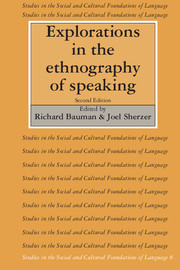Book contents
- Frontmatter
- Contents
- INTRODUCTION TO THE SECOND EDITION
- I PREFACE AND INTRODUCTION
- II COMMUNITIES AND RESOURCES FOR PERFORMANCE
- III COMMUNITY GROUND RULES FOR PERFORMANCE
- IV SPEECH ACTS, EVENTS, AND SITUATIONS
- V THE SHAPING OF ARTISTIC STRUCTURES IN PERFORMANCE
- VI TOWARD AN ETHNOLOGY OF SPEAKING
- Introduction
- 19 Data and Data Use in an Analysis of Communicative Events
- 20 The Ethnography of Writing
- 21 Ways of Speaking
- Notes
- References
- Index of names
19 - Data and Data Use in an Analysis of Communicative Events
Published online by Cambridge University Press: 05 June 2012
- Frontmatter
- Contents
- INTRODUCTION TO THE SECOND EDITION
- I PREFACE AND INTRODUCTION
- II COMMUNITIES AND RESOURCES FOR PERFORMANCE
- III COMMUNITY GROUND RULES FOR PERFORMANCE
- IV SPEECH ACTS, EVENTS, AND SITUATIONS
- V THE SHAPING OF ARTISTIC STRUCTURES IN PERFORMANCE
- VI TOWARD AN ETHNOLOGY OF SPEAKING
- Introduction
- 19 Data and Data Use in an Analysis of Communicative Events
- 20 The Ethnography of Writing
- 21 Ways of Speaking
- Notes
- References
- Index of names
Summary
The papers in this volume present a wide range and impressive quantity of new empirical data on how people talk and on the rules which govern that talk and its interpretation. Authors have used their data in several different ways, variously (1) organizing descriptive frames from which testable propositions can be derived; (2) creating theoretical frames which facilitate the search for new data sets; (3) actually testing theories. In this connection I would like to elaborate somewhat on the theme of the interaction of data and theory – or more specifically, the uses of societally or culturally specific social behaviors in moving toward identification of behaviors (and structural features constraining those behaviors) characteristic of men in all societies. I will do this by remarking on: (1) sources of data (and their dangers); (2) some modes of organizing data in our search for descriptive adequacy, and (3) reasons for formalization and possibilities for theory which has explanatory adequacy. While I will not always make it explicit, all of what I say should be seen against a comparative backdrop – the ‘theys’ of specific ethnographic reports and the ‘us’ of our own society combined into a global ‘us’ – social man wherever he is found.
Data
Concern about the validity of informant reports is central to the ethnographic enterprise. Labov (1972b) recently chastised a group of linguists about the dangers of circularity and reflexivity in the theory-informed intuition-theory confirmation cycle.
- Type
- Chapter
- Information
- Explorations in the Ethnography of Speaking , pp. 419 - 424Publisher: Cambridge University PressPrint publication year: 1989



